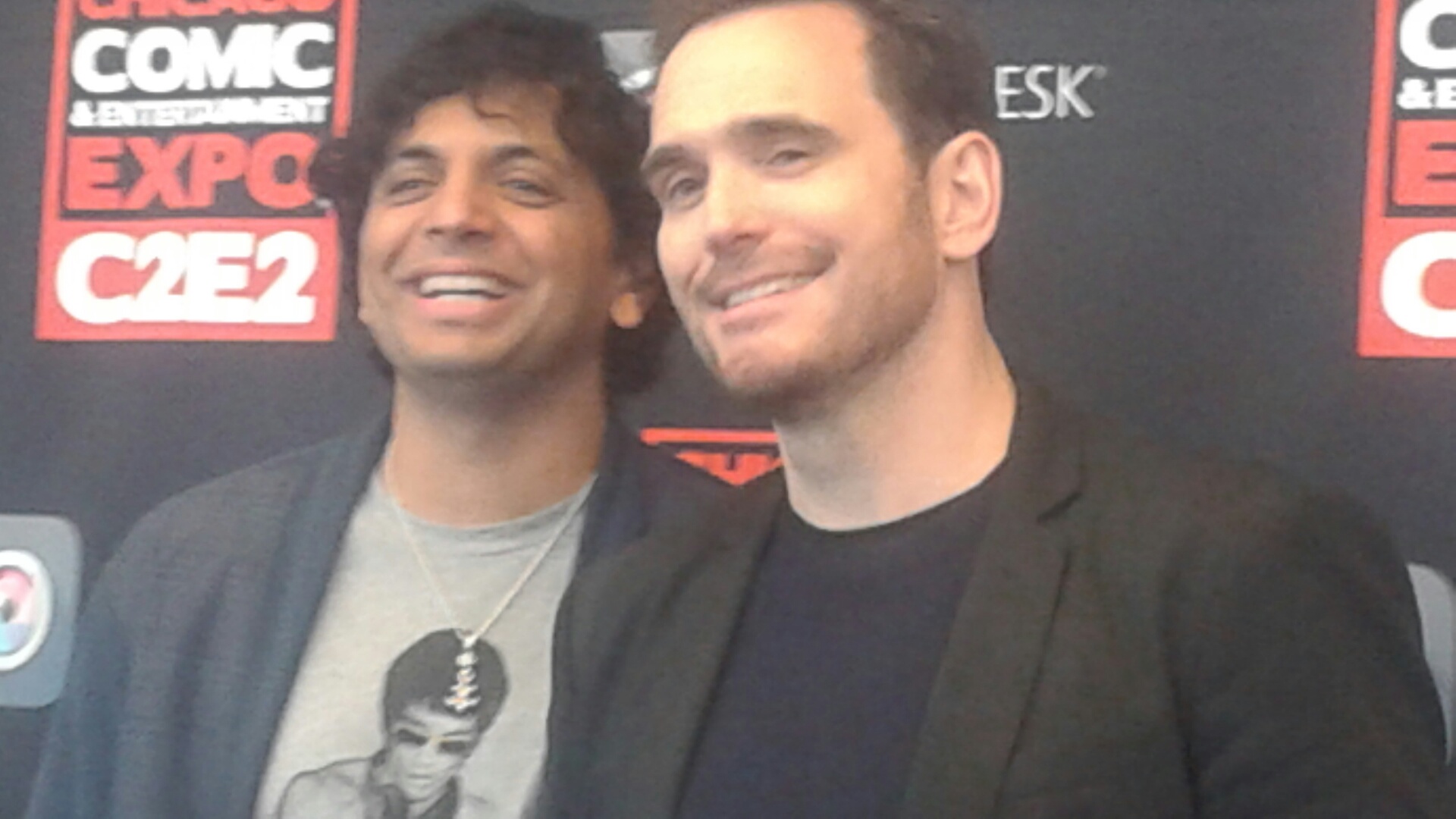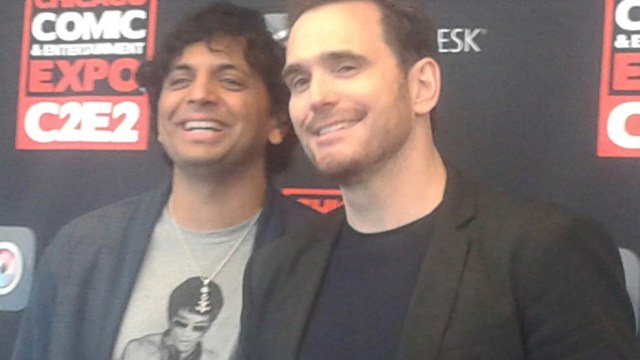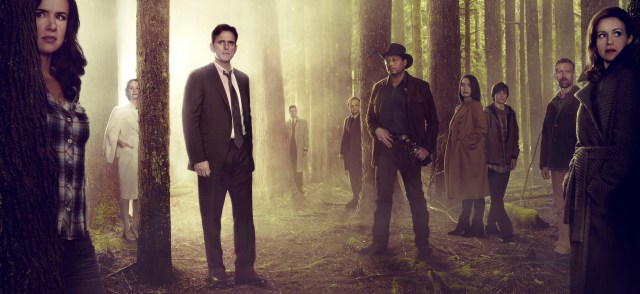The Mary Sue Interview: M. Night Shyamalan and Matt Dillon Talk Wayward Pines
The pines are not what they seem.

If you’re a fan of Twin Peaks, then M. Night Shyamalan definitely recommends checking out Wayward Pines. The Shyamalan-produced Fox adaptation of Blake Crouch’s books features all the skullduggery and possibly-supernatural twists that TP fans are accustomed to, as well as its very own FBI agent protagonist: Matt Dillon’s Agent Ethan Burke.
On the first day of C2E2, Shyamalan (who hinted to The Mary Sue that he’s now working on a script specifically inspired by Lynch’s Blue Velvet) and Dillon spoke to reporters about the challenges of adapting a book for the screen and the creative advantages of bringing a story to TV.
M. Night Shyamalan: I’ve been asked to do TV a bunch, they send pilots or send ideas or somebody will pitch me, but this one my office read it and my executive over there read it, and I saw his face–I came in and I was talking about something completely different and unrelated and I saw his face and I stopped what I was saying and said “what? What are you reading?” He finished it and handed it to me at the end of the day and said “you need to read this.” Usually he’s like “it’s pretty good for ten pages” or “there’s this thing, it’s kind of like this show,” but no sell, he was just like “here, you need to read this.” And I read it at nighttime that night, and it sucked me in. I had no idea what was going on, which I loved. And it was exactly that right tone, that kind of David Lynchian “what is going on?”
Reporter: Do you like the long-form storytelling as opposed to movies?
Shyamalan: I’m definitely a filmmaker. The problem with that format is it’s very plot-driven, in film the characters are really subservient to the plot. You need to get to the explosion and the build, whereas with TV because it’s long-form it’s about characters, so ultimately lots of stuff can happen–somebody can die, blah blah blah–but really it’s about making you guys fall in love with the characters, which I love. I love to do the dinner table scene more than the big action scene in a movie.
Reporter: You’re more than two decades into your career. Would you say that your style has evolved?
Shyamalan: You know I think more in nuance, things come to mind. I do like oddity, even this affiliation or instinct to go for dark comedy in thrillers like with Wayward or The Visit, that’s more of a confidence from saying I really understand how I want to be off-kilter a little bit.
The Mary Sue: What is it like to play a character that due to the given circumstances of the story has so many questions? That definitely presents a specific set of challenges.
Matt Dillon: It was nice because I as the actor had a lot of questions, so it’s nice when those two things come together. I think its really important that Ethan asks the questions to keep the tension, and I think the difficult part for the story tellers and the writers and the story creators, is how do you do that without tipping certain things off? My side of it was always well, he has to ask these questions, otherwise the audience is going to be asking these questions.
So I liked it, it was an interesting thing because Ethan is really the straight guy in the show, a lot of people have different secrets that they’re holding on to and there’s lots of different levels of what people know and what people don’t know about this particular town that they’re in, and Ethan’s sort of learning it as he goes along. And of course there are also personal issues tied to his profession in the secret service. He has Post-traumatic stress disorder, he’s had meltdowns in the past and he’s also, when he arrives in town, been in a head-on automobile accident so he even begins to question his sanity. Very strange circumstances.
TMS: Had you read the books at all?
Dillon: No, well they told me not to. ‘Don’t read the books, because a lot of it is changing!’ Of course they say that because actors when we read the books we go ‘why isn’t it in the script?” I think constructing a story for the screen is a very different thing than writing a book. I think there’s a lot you can get away with in terms of the style and the internal life in a book that can leave holes in the screen. Im not saying that this book had that, but in general. But I like the atmosphere and I like the world and when I read the first two episodes I felt like “wow, I really feel like this is a world.” I felt like I was reading a book. It was a treat to find out more.
Reporter: What first attracted you to the script?
Dillon: What I like about it is I like a good mystery. I liked it coupled with Night, this type of material. I liked his way of telling the story…I wasn’t interested in a TV series, you know, but this is a limited series, it’s a nice one, it’s sort of a patient, longer format, so you can kind of grow with the character.
Reporter: Do you find you prefer that?
Dillon: I find that under the best of circumstances it can be the best thing. I love the big screen, I love the magic of what happens and the way a movie can change your life, but I think television has this big creative potential, especially in a limited series like this where you can tell a story in over ten hours. That’s called a limited series, but it actually is less limiting.
In addition to hanging with The Mary Sue, Dillon also spent yesterday with comics royalty:
Great time today at @c2e2. Ran into this legend! @TheRealStanLee #WaywardPines pic.twitter.com/FpZiiKIYF2
— Matt Dillon (@MattDillon) April 24, 2015
Not a bad way to spend the day, I’d say. You can catch up on Wayward Pines for yourself on Hulu or find additional information on streaming the series here.
This interview has been edited and condensed.
—Please make note of The Mary Sue’s general comment policy.—
Do you follow The Mary Sue on Twitter, Facebook, Tumblr, Pinterest, & Google +?
Have a tip we should know? [email protected]

